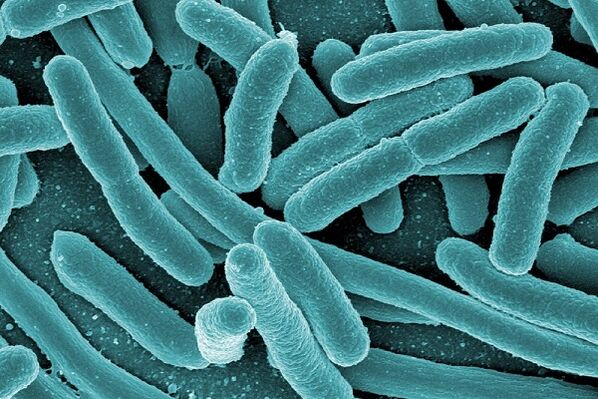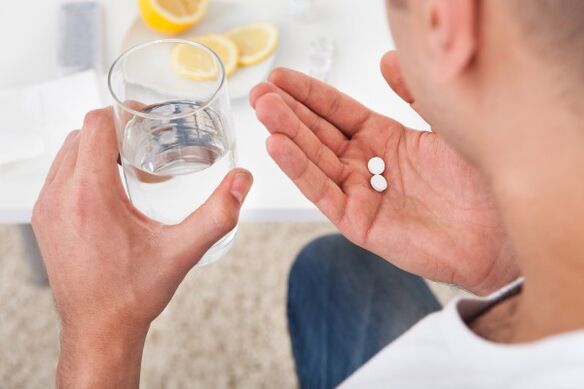In medicine, an infection is an infection of an organ or tissue with various microorganisms, as well as parasites and some insects. Thus, infectious prostatitis is an inflammation of the prostate gland caused by bacteria, viruses or fungi.

The first group of microorganisms is more often to blame. Think about what causes a prostate infection, how the disease manifests itself, and how it can be treated in men.
Causes of infectious prostatitis
A healthy person has a defense mechanism against various foreign organisms - the immune system. If this mechanism fails, or if the conditions make the infections stronger than the immune system, the prostate tissue becomes infected, leading to an inflammatory process and unpleasant symptoms.
Infectious prostatitis can be caused by:
- Sexual intercourse with an infected partner. Even if a woman has no visible symptoms of sexually transmitted diseases, there is a pathogen, a man can be infected. As a rule, first urethritis begins, then an infection enters the prostate along the urinary tract, where it causes prostatitis.
- An existing source of infection in the body. In pneumonia, influenza, caries and other diseases, the pathogen can enter the prostate through the bloodstream from other organs.
- Lifestyle features. Alcohol, nicotine, lack of physical activity weakens the immune system, as a result of which bacteria that live permanently in the skin and mucous membranes of humans become the cause of the disease.
- Injuries. During exercise, combat, or an accident, the perineum can be mechanically affected, causing damage to the prostate tissue and leading to an infectious form of the disease.
- Hypothermia. Due to the low ambient temperature and subsequent freezing, the immune system will not be able to cope with the bacteria entering the body.
Prostate infection is possible with some medical procedures and surgeries. For example, prostatitis can occur with catheterization performed in violation of all rules and regulations. In this condition, urethritis develops first, and only then prostatitis develops as a complication. Also, the disease can be a complication of a biopsy.
Sexually transmitted infections are the most dangerous for men's health.

Symptoms of infectious form
Infectious prostatitis always has an acute course, the symptoms appear unexpectedly for the patient, quickly intensify and cause serious discomfort. It is impossible to ignore the symptoms of this disease.
Men go to the doctor with the following complaints:
- Acute, often throbbing pain between the anus and the egg. It can "give" to the genitals, lower back or abdomen.
- Increased body temperature to 38-39 degrees, fever, chills. The temperature in the rectum may rise, and in the armpits it may be maintained at normal levels.
- Frequent urination and urination, especially at night.
- Pain when urinating, interstitial flow of urine, burning in the urethra.
- Weakness, nausea, loss of appetite, painful muscles or joints.
- Fecal incontinence - constipation develops or pain occurs during the act of defecation.
- Decreased sexual desire, slow erection, painful ejaculation.
If a man is in no hurry to go to the doctor and is in pain, or if he tries to treat himself with antibiotics and folk remedies, the pain and urinary tract disorders may pass after a certain period of time. The illusion of recovery arises. In fact, the infection has not passed and the acute form of prostatitis has become chronic. This means that from time to time a man will have flares, and there is a risk of developing infertility.
Infectious prostatitis can result in blood poisoning and death of the patient, so you do not have time to deal with the pathology yourself.
Modern diagnostic methods
The clinical picture is so clear that a doctor can make a correct diagnosis based on the symptoms listed above. In addition to the typical complaints, the anamnesis taken at the reception is also taken into account - so it is important to visit a medical institution in a timely manner.
In order to choose the right treatment tactics, it is important to understand more precisely what is happening in the body and which pathogen is causing the pathology. Therefore, this work requires a certain amount of expertise.
During the reception, the doctor will perform the following activities:
- It will measure body temperature in the anus and armpit (with infectious acute prostatitis, there will be a difference in readings up to 0. 5 ° C).
- Check the condition of the lymph nodes in the pelvic region.
- Palpate the lower abdomen, perineum, lower back.
With this form of the disease, prostate massage is not performed due to severe pain. Also, such manipulation can cause the infection to be transmitted from the gland to other organs and systems, resulting in death. Even the suspicion of infectious prostatitis is a contraindication to such procedures.
Laboratory tests of blood, urine, bacterial cultures are important. With their help, you can determine the type of pathogen and confirm the inflammation.

Instrumental methods TRUS, CT, MRI, uroflowmetry (to determine the rate of urine flow) and other methods can be used at the discretion of the attending physician. Transrectal ultrasound is often sufficient, along with laboratory tests and medical history. CT or MRI is performed when a tumor is suspected or suspected.
Principles of modern treatment
If there are no obvious signs of intoxication, treatment at home is allowed. Otherwise, hospitalization, intravenous infusions of antibacterial agents, and increased monitoring by medical personnel will be required. In either case, a sick person needs bed rest - even a small amount of physical activity can cause the infection to spread through the bloodstream.
Treatment of patients is aimed at achieving two goals: the fight against pathogenic microflora and improving overall well-being. In general, action in this direction is designed to prevent the development of death or complications.
Fighting infection
If laboratory tests show that infectious prostatitis is caused by bacteria (most common), the use of antibacterial agents should be the basis of therapy. Only if you start such a treatment, the improvement in well-being will come in 2-3 days. But for this you need to choose the right drug. The duration of medication is also important - it can be up to a month, depending on the specific drug and the degree of damage to the prostate. Treatment should not be interrupted.
In addition to the type of pathogen, the doctor must take into account some other factors.
- Individual characteristics of the patient, the condition of the heart, liver and kidneys.
- If possible, opt for a stronger drug by overshadowing such bacteriostatic agents.
- The effect of therapy with antibacterial drugs should be bactericidal, ie aimed at destroying the pathogen, rather than stopping its growth in the tissues of the prostate gland.
For these reasons, the treatment of infectious prostatitis alone is not possible. Without medical education and the ability to interpret diagnostic measures, it is almost impossible to choose the right antibacterial agent. Delay, like the wrong treatment in this situation, can be costly.

Symptomatic treatment
The intensity of pain in infectious prostatitis is such that standard painkillers and antispasmodics may be useless. In such exceptional cases, the doctor may prescribe a short course of drugs to relieve pain.
Can also be assigned:
- Diuretics for the prevention of cystitis (in the absence of acute urinary retention).
- Laxatives to reduce prostate pressure (if constipation).
- Non-steroidal anti-inflammatory drugs.
- Alpha-blockers - to normalize the urinary process.
- Muscle relaxants to relieve pelvic floor muscle spasm.
If acute urinary retention occurs during infectious prostatitis, a urinary catheter may be inserted into the patient.
If it is found that the patient's well-being does not improve during treatment, this is a reason to make an additional TRUS to rule out a possible prostate abscess. In suspected cases, a biopsy of the prostate tissue may also be performed. If the diagnosis is confirmed, the patient undergoes emergency surgery to open and empty the abscess. In this case, antibiotic therapy will not be canceled.
Danger of infectious prostatitis
If a man sees a doctor on time and does not violate his prescriptions, recovery almost always occurs. In some cases, the transition to a chronic form or the development of chronic pelvic pain syndrome (CPPS) is possible.
Other possible results:
- pyelonephritis or cystitis;
- blood poisoning;
- formation of fistulas.
Infectious prostatitis starts on time and responds well to treatment. To do this, men must listen to their health. If the pain in the perineum begins with a simultaneous increase in body temperature and urinary incontinence in the anus, you should see a doctor immediately. Using folk remedies and following the advice of a friend or wife can be disastrous.
























